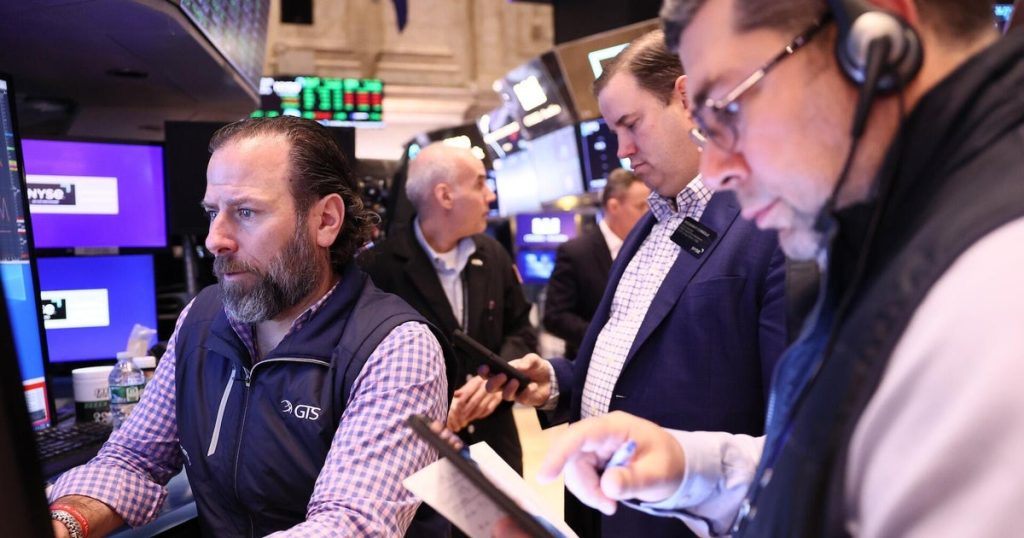In a turbulent trading session on Wall Street, stocks plummeted on Monday as investors braced for President Trump’s impending announcement regarding new tariffs, slated for April 2 and dubbed “Liberation Day.” Amid fears of higher prices and inflationary pressures, consumer confidence has dipped significantly, reaching a 12-year low as more Americans voice their concerns over these economic policies. The day’s losses reflected broader anxieties regarding a slowing U.S. economy and escalating trade tensions, with major indices, including the Dow, S&P 500, and Nasdaq composite, facing substantial declines.
| Article Subheadings |
|---|
| 1) Wall Street’s Response to Tariff Threats |
| 2) Economic Impact of Tariffs on Consumers |
| 3) Tesla’s Decline Amid Political Controversy |
| 4) Broader Market Reactions |
| 5) Safe Haven Investments and Market Trends |
Wall Street’s Response to Tariff Threats
On Monday, Wall Street experienced a sharp decline, with the Dow Jones Industrial Average dropping 403 points, roughly a 1% decrease. This reaction came ahead of President Trump’s anticipated tariff announcement, which he has termed “Liberation Day.” Investors are on high alert as tariffs often entail additional import fees, which can trickle down to consumers as increased prices for goods. The apprehension surrounding the announcement has caused a ripple effect throughout the markets, resulting in significant losses for major indices. The S&P 500 index and the tech-heavy Nasdaq composite did not fare any better, falling 1.6% and 2.5%, respectively, as uncertainty dominated the trading atmosphere.
Economic Impact of Tariffs on Consumers
The impending tariffs pose a serious threat to the economic landscape, particularly for average American households. Economic analyses reveal that the public likely bears the brunt of the higher costs that tariffs invariably impose, resulting in inflated prices for everyday goods. Consumer confidence has sharply declined this March, hitting a 12-year low as fears about growing inflation coalesce with economic anxiety from rising trade tensions. According to Bob Schwartz, a senior economist at Oxford Economics, stronger inflation fears alongside deteriorating consumer prospects are pushing consumer confidence into a recession-like state. Households are becoming increasingly cautious, leading many to tighten their spending and avoid making major purchases.
Tesla’s Decline Amid Political Controversy
The struggles of electric car manufacturer Tesla have compounded the narrative of a faltering market, with shares of the company down 5.6% following on the heels of the news about tariffs. CEO Elon Musk has faced severe scrutiny as Tesla’s stock has plummeted 42% since President Trump took office. The negative perception surrounding Musk has intensified in light of his support for government reforms and spending cuts, leading to protests against the company. Sales in key markets like Europe and the United States have begun to wane, possibly attributable to Musk’s hardline political inflections. Additionally, acts of vandalism against Tesla properties have further highlighted the tension in the automotive sector.
Broader Market Reactions
The market’s current trajectory reflects a growing realization that trade policies directly impact not only tariffs but also overall economic stability. The S&P 500 recently witnessed a significant downturn, with a 2% drop marking one of its leaner days in recent years. This slump represents the fifth losing week out of the last six, with the index down over 5% year-to-date. The challenges presented by inflationary pressures combined with a stagnant economy have left investors in a precarious situation, grappling with uncertain returns. Firms like Apple and Rocket have not been unaffected; Apple faced a minor drop after encountering regulatory challenges in France, while Rocket’s acquisition of Mr. Cooper initially caused concern among investors despite its long-term potential. Such developments paint a larger picture of volatility and uncertainty in the markets.
Safe Haven Investments and Market Trends
As concerns mount and market volatility persists, many investors are reducing their exposure to equities in favor of traditional safe havens. One notable indicator is the price of gold, which recently hit a record high before stabilizing around $3,149 an ounce. This movement signifies a shift in investment strategy, where traders seek refuge in more stable commodities amidst the chaos induced by tariffs and economic instability. The allure of gold as a haven remains strong during these tumultuous times, as investors search for security within the uncertain domain of the stock market.
| No. | Key Points |
|---|---|
| 1 | Wall Street faced significant declines due to the anticipation of new tariffs. |
| 2 | Consumer confidence has dropped to a 12-year low, raising fears of inflation. |
| 3 | Tesla continues to struggle as its stock falls 42% since the current administration took office. |
| 4 | The market’s overall trend shows investors seeking safety in commodities like gold. |
| 5 | Economic uncertainty leads to volatility among major companies and continued protest of corporate policies. |
Summary
In conclusion, the current economic landscape is fraught with uncertainty as the impending tariffs threaten consumer confidence and market stability. The significant market reactions reflect broader concerns about inflation and economic growth, exacerbated by political tensions and corporate controversies. As investors seek safer assets in the face of volatility, the long-term effects of these economic policies will be critical to monitor in the coming months.
Frequently Asked Questions
Question: What are the implications of the new tariffs on consumers?
The new tariffs imposed are likely to lead to increased prices for various goods, thereby affecting consumer wallets directly as businesses may pass these costs onto consumers.
Question: How has consumer confidence been impacted?
Consumer confidence has reached a 12-year low this month, with growing fears about inflation and the uncertain economic environment influencing consumers’ willingness to spend.
Question: What is the current trend in the stock market?
The stock market has experienced notable declines amidst fears related to tariffs and inflation, prompting many investors to seek safety in traditional commodities like gold.


